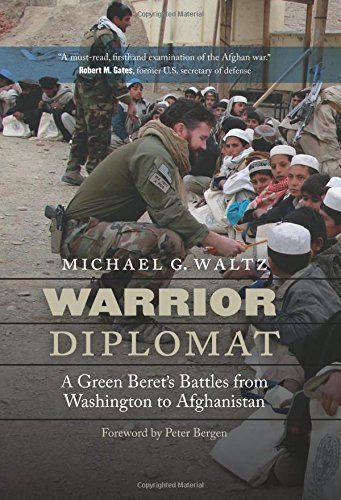New Article at Pragati: Diplomatic Warfare?
[by Mark Safranski, a.k.a. “zen”]

I have a new article up at Pragati: The Indian National Interest. A review of Warrior Diplomat by Michael G. Waltz
….Waltz, now the president of Metis Solutions, brings to the table a powerful juxtaposition of perspectives on the Afghan war. As a Department of Defense civilian official, he served variously as an Interagency Counter narcotics Coordinator in the Office of the Secretary of Defense (OSD) developing strategies to combat opium trafficking in Pashtun regions, as the Pentagon’s Afghanistan Country Director, as the Special Adviser to Vice President Dick Cheney on South Asia and Counterterrorism and finally, as an adviser on negotiations with the Taliban to the deputy assistant secretary of defense in the Obama administration.
This is “making policy at 50,000 feet”, briefing and advising senior administration officials on national policy formulation and implementation. No contrast could be more dramatic with Waltz’s alternate role as a Green Beret company commander living among Pashtun tribal villagers, drinking tea with tribal elders, working with village police chiefs, engaging in brutal firefights with Haqqani network insurgents, disarming IEDs and delivering medical care to remote Afghan districts. Like few other officers, Waltz could see the life or death impact of policy he had helped craft on his own soldiers, Afghan farmers, and the Taliban enemy; but at other times, the blindness of policy or its complete irrelevance to the often ugly ground truth of counterinsurgency warfare.
Though the story of Waltz’s gritty experience in combat looms large in Warrior Diplomat, he also lays out a hard analysis regarding the self-created problems that impaired the American war in Afghanistan, including a paucity of resources, the incapacity of NATO partners, a muddled strategy, bureaucratic and political risk aversion and micromanagement of military operations down to the smallest units, a stubborn refusal to confront Pakistan over Taliban sanctuaries and announcing an early withdrawal date from Afghanistan. There is an additional subtext to Waltz’s story; the transformation of the legendary Green Beret Special Forces, intended to work autonomously in small groups training and fighting with indigenous forces, to ‘conventionalised’ units of ‘door-kickers’ who spend enormous amounts of time on powerpoint slides, making fruitless requests for helicopters or artillery support and fighting the timidity and capriciousness of Waltz’s own chain of command.
Read the rest here.
Some of you may have read American Spartan or my earlier review of that book. The stories of Michael Waltz and Jim Gant are not the same but the setting, their operational environment, largely was. Some of the frankly preposterous, Catch-22 restrictions with which Waltz struggled mightily to comply while effectively circumventing may illuminate some of the unspoken reasons why Jim Gant took a different path.
I cannot say it was the objective of the US Army and ISAF to prevent effective COIN operations in Afghanistan in writing their regulations and ROE, but it might as well have been



January 18th, 2015 at 3:40 am
We will draw all sorts of silly conclusions from our experience in Afghanistan- classic small war practices don’t work, Americans can’t do small wars, the ‘graveyard of empires’ really is true, small wars are just too hard, and on and on. The lesson we won’t draw, though illustrated in Mr. Waltz’s book (and almost every other damn thing you read*), is that the American military can’t fight effectively and it can’t win…any war, big or small. To paraphrase Abu Muquawana, we just don’t do war well anymore.
We won’t draw that conclusion. We won’t, but our enemies will, and have.
*I read something in a Stars & Stripes story by Josh Smith from Oct 19, 2014. He was describing a poster in a conference room at FOB Fenty near Jalalabad. The poster described what winning looked like. One of the goals it mentioned was “encouraging a constructive relationship between the Afghan and Pakistani militaries”. Going on 14 years we’ve been there and going on 14 years the Pak Army/ISI has been waging unconventional war upon us and that is a goal. We just don’t do war well.
January 18th, 2015 at 5:43 am
Hi Carl
.
No we don’t. It is a political choice by our elites not to do war well as their barometer is careerism, ideological fetishes and self-enrichment. Their class interests (which have clearly diverged from national interests as happens with oligarchies) are not harmed by losing wars or lying outrageously while losing them. quite the reverse, they profit from long and unsuccessful wars in the duration and shift blame for the defeat
January 18th, 2015 at 1:23 pm
Zen:
.
Yes, you are right of course as far as it goes but I think our elites include the high ranking officer corps. The class interests you describe apply to the multi-stars as much as to the civilians, so to those interests not being harmed by lying and losing. The Meyers and Swensons of which there are so many in the ranks can’t make up for the moral corruption of the senior officer corps.
.
We, the Americans, can’t do war well when led by such people both uniformed and civilian.